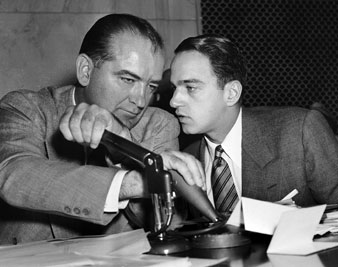Gaming Out Environmental Law: 2017-2019
The heavens or the abyss? Or somewhere in between?
What happens after November? A lot depends on who’s the next President, but the congressional elections also matter.
Basically, a Trump victory would mean at least a rollback of much of Obama’s environmental legacy, and perhaps passage of the current House deregulatory agenda into law. A Clinton victory would be likely to preserve or strengthen the Obama legacy, and could conceivably lead to new climate legislation. Of the two extreme outcomes, enactment of the House deregulatory agenda would require somewhat less of a wave election and is therefore more likely than federal climate legislation.
Here are the most important scenarios:
Scenario 1. Trump wins the White House. He’s never been predictable, but based on everything he has said to date, this means that Trump will begin proceedings to rescind key Obama Administration rules and that he would renounce the Paris Agreement. It also seems likely that he would appoint a new Justice who is (at most) no more liberal than Kennedy, returning the Court to its equilibrium before Scalia’s death. This would leave the Clean Power Plan and the Waters of the United States rule in serious jeopardy with or without new rule making. Thus, it would be likely that we would see at least a partial rollback of Obama-era environmental regulations. As to whether there will be more drastic changes, this seems to depend on which of the following sub-scenarios happens:
Scenario 1A. The Democrats gain control of the Senate. In this situation, more radical changes are likely to be stymied to a large extent. But if Trump wins the presidency, it will be somewhat surprising if at the same time the Democrats retake the Senate. Still, it’s been a surprising year in many ways, so this could happen.
Scenario 1B. The Democrats don’t have control of the Senate but they keep enough seats to mount a filibuster and the GOP decides not to use the nuclear option to eliminate the filibuster entirely. This means that Republicans would be limited to using the reconciliation procedure to make changes, meaning that they would have to show that changes would reduce government expenditures. Under either Scenario 1A or 1B, Trump’s choice of a Supreme Court Justice would remain somewhat constrained, but he could fill the lower courts with arch-conservatives if he chose to.
Scenario 1C. The Democrats lose the filibuster option one way or the other, with the Republicans controlling both Houses. Then we would expect to see something like the legislation that keeps passing the House, permanently disabling EPA from addressing climate change, etc.
Scenario 2. Clinton wins the White House. Then the Obama regulations will not be rolled back, and her appointee will at a minimum be as liberal as Garland, shifting the Court to the Left. This does not guarantee that the Court will uphold the Clean Power Plan and Waters of the United States rules, but makes it much more likely. The rest depends on what happens in Congress:
Scenario 2A. Republicans retain Senate control. We know what that scenario looks like because it would be very much like the present, except that it would be hard to avoid scheduling a vote on Garland.
Scenario 2B. Democrats retake the Senate, but Republicans can still filibuster. If Republicans hold the House, gridlock continues. However, Clinton can probably move somewhat left with her nominee while still making it difficult for Republicans to oppose the nomination (particularly given the background threat of the nuclear option).
Scenario 2C. Democrats win both the House and the Senate. This is an unlikely but not impossible scenario. It would allow the Democrats to use the reconciliation mechanism to enact either a carbon tax or an emissions trading system, since both would generate revenue. How much the Democrats could do beyond that legislatively would depend on whether they are able to overcome the GOP filibuster strategy. It would take a major “wave” election for this scenario to happen, and the Democrats might well be tempted to exercise the nuclear option if necessary; even as cautious a leader as Clinton might be tempted to go for some major legislation.
The conventional wisdom right now seems to favor at least marginally the odds of a Clinton victory, with Scenarios 2A and 2B as equally likely. If Trump wins, I would guess that the Republicans would also keep the Senate, although who knows what might happen in individual races. This would lead to Scenario 1B as the most likely scenario, unless the Republicans exercise the nuclear option and go for Scenario 1C.
Of course, as I said earlier, this has been a surprising year, so that leaves us with Scenario 3:
Scenario 3. Something completely weird and unforeseeable happens. Your guess about that is as good as mine. Maybe Trump will appoint Ivanka to the Supreme Court, and she’ll turn out to be a raging liberal. Or maybe space aliens will land on the White House lawn and announce that they’re walling off the Earth from the rest of the universe. Or whatever. The meaning of “unforeseeable” is that we don’t know what it might be! Of course, I reserve the right to say that I foresaw the event all along — a right that I’m sure every political pundit in America will quickly exercise.
Reader Comments
One Reply to “Gaming Out Environmental Law: 2017-2019”
Comments are closed.







Dan, once again I thank you very, very much for your excellent individual efforts to inform and motivate those few of us who read LP and BB blogs.
At this rate, I fear that if you and your colleagues do not find a way to disseminate this information to educate and motivate voters throughout America before the election, then the only satisfaction we shall be able to get is “I TOLD YOU SO” on our gravestones.
I haven’t even heard anything from IPCC for quite a while, so it appears as if the U.N. has given up.
As you know far better than I, now that we have skyrocketed past 400 ppm, time has run out already considering the climate change records we are experiencing today.
Like Churchill said:
“NEVER, Never, never Give Up!”
Too bad we don’t have another leader like Churchill around today to save the world again.